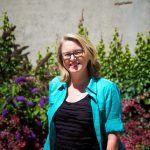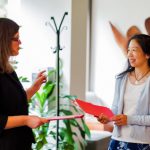Students teach, learn, and practice beyond our walls

Recent School of Nursing retiree Joanne Ricci and newly appointed instructor Ranjit Dhari trained and supervised students, like Angela Rivers-Bowerman, who gave seasonal protection to our Director, Elizabeth Saewyc (above left); Caryn Dooner, who vaccinated James Olson, Dean of Applied Science (centre); and Matt Russell, who gave shots to both Joanne (above right) and to President Santa Ono (below). Students also gave free flu shots at Oppenheimer Park in Downtown East Side in October.
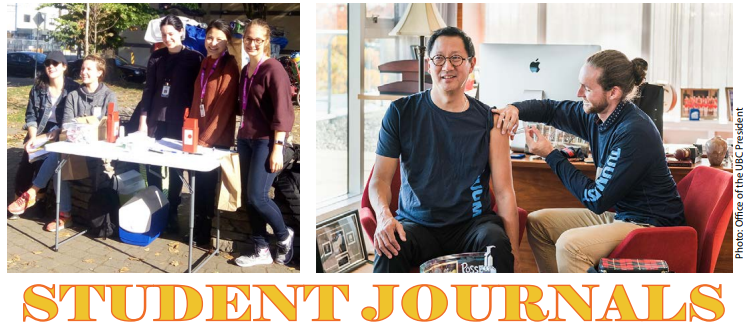
I was able to visit different locations in the DTES [Downtown East Side] (e.g. Oppenheimer Park and the Canada Hotel). With it being such a diverse population it was interesting to not only teach about the influenza vaccination, but also listen to clients as they talked about their life experiences. For example, while in the Oppenheimer park we had the opportunity to provide the vaccination to an Indigenous person. This lady then proceeded to get her drum and play her cultural music for us, explaining what the music meant. This was a rewarding experience and it reminded me of how culturally diverse Canada truly is. I enjoyed listening and learning about the music, and hearing a bit about her life story. — Ryann
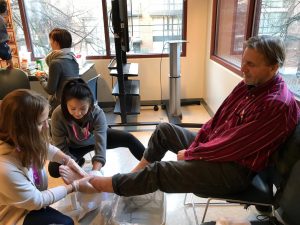 Nicole and I had a long and thoughtful conversation with a young Aboriginal man while we were doing a foot soak clinic at the Evelyne Saller Centre. He was living in the DTES but wasn’t homeless; he was also working as often as he could building sets for movies and TV shows in order to stay off the street. However, he was at Evelyne Saller to take a shower and do laundry, which made me wonder if he had access to a bathroom (or even clean water) where he lived. I wanted to ask him more details about his living situation but I also didn’t want to pester him about very personal information, especially since I’m aware that it can be embarrassing for some people. We had a great conversation and talked about his hobbies, one of which was music: he even played a few songs on his guitar for us. — Sierra
Nicole and I had a long and thoughtful conversation with a young Aboriginal man while we were doing a foot soak clinic at the Evelyne Saller Centre. He was living in the DTES but wasn’t homeless; he was also working as often as he could building sets for movies and TV shows in order to stay off the street. However, he was at Evelyne Saller to take a shower and do laundry, which made me wonder if he had access to a bathroom (or even clean water) where he lived. I wanted to ask him more details about his living situation but I also didn’t want to pester him about very personal information, especially since I’m aware that it can be embarrassing for some people. We had a great conversation and talked about his hobbies, one of which was music: he even played a few songs on his guitar for us. — Sierra
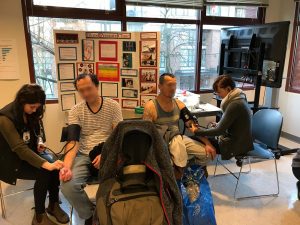 I recognized that this man was painting a mural of an aboriginal medicine wheel that I learned about in my indigenous health course. I began talking with him and he shared his life story with me, telling me that he had attended a residential school as a child. … He said that living in the DTES is very lonely as he is isolated from family and that he bottles his emotions to cope with the loss of his daughter, but often cries when no one is around. I was very saddened to hear this and it became evident that living with mental health challenges in the DTES can be even more difficult due to the barriers to accessing proper treatment. In addition, he has many cardiovascular issues and even suffered a stroke which affected his mobility, which I can imagine would have severely impacted his ability to be able to work and support himself. This interaction I had was very impactful because it was one of the moments where I could directly link what I had been learning about in class to my practice (mental illness, social determinants of health, and the effects of colonialism/assimilation on health of Indigenous people. — Nicole
I recognized that this man was painting a mural of an aboriginal medicine wheel that I learned about in my indigenous health course. I began talking with him and he shared his life story with me, telling me that he had attended a residential school as a child. … He said that living in the DTES is very lonely as he is isolated from family and that he bottles his emotions to cope with the loss of his daughter, but often cries when no one is around. I was very saddened to hear this and it became evident that living with mental health challenges in the DTES can be even more difficult due to the barriers to accessing proper treatment. In addition, he has many cardiovascular issues and even suffered a stroke which affected his mobility, which I can imagine would have severely impacted his ability to be able to work and support himself. This interaction I had was very impactful because it was one of the moments where I could directly link what I had been learning about in class to my practice (mental illness, social determinants of health, and the effects of colonialism/assimilation on health of Indigenous people. — Nicole
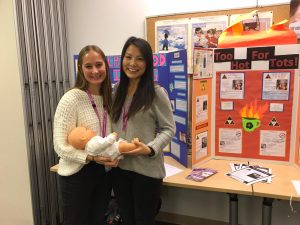 I found it emotionally challenging to work with the population in the Downtown Eastside because I felt quite sad when learning of the lifestyles the people have been living through. One moment that really stuck with me was when I was assisting a man with his flu shot intake form. I asked him for his address, as it was required on the form, and he looked back at me in silence, with a slight look of embarrassment on his face. I felt terrible in that moment, and even worse, when I reflected on when I had filled out the same form, just a week ago, without even the slightest difficulty or hesitance. In that moment, I put myself into this man’s shoes, and thought about what it would be like to not have a safe place to return to every night. I felt quite sad from thinking about it, but had to keep my emotions in check to proceed with the injection. — Rachel
I found it emotionally challenging to work with the population in the Downtown Eastside because I felt quite sad when learning of the lifestyles the people have been living through. One moment that really stuck with me was when I was assisting a man with his flu shot intake form. I asked him for his address, as it was required on the form, and he looked back at me in silence, with a slight look of embarrassment on his face. I felt terrible in that moment, and even worse, when I reflected on when I had filled out the same form, just a week ago, without even the slightest difficulty or hesitance. In that moment, I put myself into this man’s shoes, and thought about what it would be like to not have a safe place to return to every night. I felt quite sad from thinking about it, but had to keep my emotions in check to proceed with the injection. — Rachel
The following students are currently researchers with the Capacity Research Unit and have received awards in 2017-18:
Paisly Symenuk (MSN/MPH student): CIHR Frederick Banting & Charles Best Canada Graduate Scholarship (Masters); Canadian Federation of University Women, École Polytechnique Commemorative Award; Canadian Nurses Foundation, Sanofi Pasteur Limited Scholarship in Public/Community Health Award
Sunny Jiao (PhD student): CIHR Frederick Banting and Charles Best Canada Graduate Scholarship (Masters); UBC Faculty of Applied Science Graduate Award (Doctoral); UBC J. Kristine Griffith Memorial Graduate Scholarship in Nursing; Canadian Nurses Foundation, Lundbeck Canada Inc., Mental Health Nursing Award
Allie Slemon (PhD student): SSHRC Joseph-Armand Bombardier Canada Graduate Scholarship (Masters; Doctoral); UBC Izaak Walton Killam Memorial Pre-Doctoral Fellowship; UBC Four Year Doctoral Fellowship

